Supreme Court Set To Hear Landmark Case On Double Jeopardy
Later this week, the Supreme Court will hear a case that could rewrite decades of law interpreting the Fifth Amendment's Double Jeopardy rule.
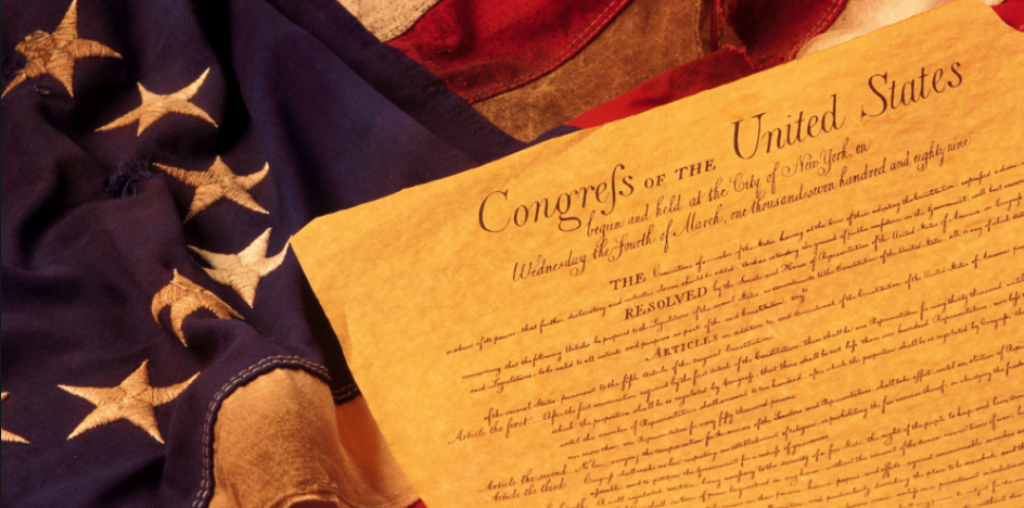
Later this week, the Supreme Court will hear oral argument in a case that could have far-reaching implications for criminal defendants who find themselves charged with crimes in both Federal and state court for what is essentially the same offense:
The Supreme Court next week takes up the case of a small-time Alabama felon, Terance Gamble, who complains that his convictions by state and federal prosecutors for the same gun possession crime violate constitutional protections against double jeopardy.
But likely to be watching the proceedings closely will be those concerned about a big-time felon, Republican consultant and former Trump campaign chairman Paul Manafort, who was prosecuted by special counsel Robert S. Mueller III for tax fraud.
With President Trump keeping alive prospects that he might pardon Manafort, Gamble v. United States might be redubbed Manafort v. Mueller, joked Thomas C. Goldstein, an attorney who regularly argues before the Supreme Court.
The outcome in the case could affect nascent plans by states to prosecute Manafort under their own tax evasion laws — New York, in particular, has expressed interest — should Trump pardon Manafort on his federal convictions.
The double jeopardy clause of the Constitution’s Fifth Amendment prohibits more than one prosecution or punishment for the same offense. But the Supreme Court since the 1850s has made an exception, allowing successive prosecutions and punishments if one is brought by state prosecutors and the other by the federal government. (One early case from that time involved counterfeiting; another was prosecution of someone harboring a fugitive slave.)
In Gamble, the court is reconsidering these precedents. Almost none of the briefs filed in the case speculate on how a presidential pardon of a federal conviction would affect prosecutors at the state level should the so-called separate sovereigns doctrine be renounced.
But the issue is being debated loudly online. While Brett M. Kavanaugh’s nomination to the Supreme Court was pending, a theory emerged in some circles that the Trump administration was in a hurry to get him on the Supreme Court in time to have him participate in the case.
The reality of Gamble v. United States is more complicated than that. For one thing, the court accepted the case before Kavanaugh’s nomination. And it is unclear how the new justice would vote on the issue or whether he is pivotal to the outcome.
For another, Trump’s Justice Department urged the Supreme Court not to take the case. It says the status quo, allowing state and federal prosecutions, should remain in place.
(…)
The real motivation for the court to reconsider the separate sovereigns doctrine came from liberal Justice Ruth Bader Ginsburg, who expressed the desire in an opinion two years ago. Her ally in that call? Conservative Justice Clarence Thomas.
“The double jeopardy proscription is intended to shield individuals from the harassment of multiple prosecutions for the same misconduct,” Ginsburg wrote in 2016. “Current ‘separate sovereigns’ doctrine hardly serves that objective.”
As the Ginsburg-Thomas alliance shows, concern about the doctrine is shared across the ideological divide.
“You see conservatives and liberals coming together on this issue,” said Brianne Gorod, chief counsel at the liberal Constitutional Accountability Center, who filed an amicus brief on Gamble’s behalf.
Their agreement reflects “a shared concern among many progressives and conservatives that there are profound problems in our criminal justice system — one manifestation of which is people being sentenced to jail time twice for the same offense, notwithstanding a constitutional provision designed to prevent exactly that,” Gorod said.
Because the states and federal government are separate sovereigns, the court has reasoned in the past, each has an interest in prosecuting someone for violating its laws, even for the exact same conduct.
The court recently signaled how seriously it is taking the question of overturning its precedent: It expanded the time allotted for oral argument. Besides hearing from Gamble’s lawyer, the court will hear separately from the Justice Department and the state of Texas, which heads a group of 36 states objecting to any change in the law.
Amy Howe previews this week’s argument for SCOTUSBlog:
Alabama charged Gamble with violating state drug laws; both the state and the federal government also charged him with being a felon in possession of a firearm. A state court in Alabama sentenced Gamble to one year in prison.
Gamble urged the federal trial court to throw out the charge against him, arguing that prosecuting him in federal court after the state had charged him would violate the Constitution’s double jeopardy clause, which guarantees that no one shall “be twice put in jeopardy” “for the same offence.” The trial court rejected his claim, explaining that it had to follow the separate sovereigns doctrine unless and until the Supreme Court overruled it. The trial court sentenced Gamble to nearly four years in federal prison, followed by a year of supervised release. The U.S. Court of Appeals for the 11th Circuit upheld the district court’s ruling and Gamble’s sentence. Gamble asked the Supreme Court to weigh in; the justices considered his case at 11 consecutive conferences before agreeing to do so.
In the Supreme Court, the federal government insists that the separate sovereigns doctrine should remain in place. The text of the double jeopardy clause bars successive prosecution and punishment for the same offense, the government emphasizes, not for the same conduct. And when it uses the term “offence,” the government continues, the double jeopardy clause is referring to the violation of a law. The same conduct can violate two different sovereigns’ laws and constitute two different offenses, which each sovereign can then punish and prosecute separately. If the Framers had wanted the clause to apply more broadly, the government adds, they would have used the term “conduct” or “acts” rather than “offence.”
Gamble offers a very different interpretation of the text, telling the justices that nothing in the text points to any exceptions to the double jeopardy clause. Instead, he stresses, the text of the clause bars prosecution of the “same offence,” without suggesting that two prosecutions for the same offense would be acceptable as long as they are prosecuted by two separate sovereigns. To the contrary, Gamble observes, Congress considered but rejected an exception that would have allowed the federal government to prosecute a defendant even after he’d been convicted for the same offense under state law.
Gamble contends that the separate sovereigns doctrine is also inconsistent with the purpose of the double jeopardy clause. Permitting two consecutive prosecutions for the same conduct on the ground that prosecutions are brought by two different sovereigns, Gamble argues, “hardly serves the deeply rooted principles of finality and fairness the Clause was designed to protect,” particularly when it would still require two trials and could potentially lead to double punishments.
Gamble tells the justices that the principle of adhering to prior decisions – known as stare decisis – should not stand in way of overruling the separate sovereigns doctrine. First, he says, the doctrine “has long been questioned by members of this Court, lower-court jurists, and legal scholars” – including by both Justice Ruth Bader Ginsburg and Justice Clarence Thomas.
Second, he explains, when the Supreme Court established the doctrine, the double jeopardy clause did not apply to the states, so it would make sense that at that time the clause would bar successive prosecutions by the federal government, but wouldn’t prohibit the federal government from prosecuting a defendant even after a state had prosecuted the defendant for the same offense. Now that the double jeopardy clause does apply to the states, though, the rationale for the doctrine is gone.
Another reason to overturn the separate sovereigns doctrine, Gamble continues, is that the Supreme Court believed when it adopted the doctrine that duplicative prosecutions by state and federal governments would be “exceedingly rare,” because federal criminal law was very limited. But federal criminal law has expanded significantly during the past half-century, Gamble observes, “far beyond what the judicial framers of the separate-sovereigns exception could have possibly imagined.” As a result, Gamble claims, “nearly every crime can be charged both in state court and in federal court.”
(…)
The government urges the justices to stick with the separate sovereigns doctrine, describing it as a simple rule to apply: All that matters, the government says, is whether governments are separate sovereigns, something that Supreme Court has already made clear. By contrast, the government argues, overruling the doctrine would require courts to tackle “a new and vexing problem”: determining whether laws passed by two different sovereigns target the same “offense.”
A ban on any successive prosecutions would also create a variety of problems, the government warns. For example, under Gamble’s interpretation, the U.S. or a state government would not be able to prosecute a foreign terrorist if a foreign government had also tried him. Abandoning the separate sovereigns doctrine could also lead to a flood of challenges by inmates convicted by two different sovereigns who want to overturn the second conviction, even if it became final long ago.
Overruling the doctrine would also weaken efforts to hold responsible perpetrators of domestic violence against Native Americans, the government asserts. Native American tribes face a number of obstacles that hinder their ability to address and punish domestic violence, but the current interpretation of the double jeopardy clause allows tribes to enforce existing laws immediately, without precluding the federal government from later prosecuting the same defendant under federal domestic-violence laws that impose greater punishments for repeat tribal offenders. A “friend of the court” brief filed by Native American women underscores this point, noting that “[n]ative women and children face the highest rates of domestic violence, murder, and sexual assault in the United States.”
The government concedes that a “successive prosecution by a different sovereign can impose substantial burdens on a defendant and will often be unnecessary.” But, it counters, a successive prosecution may be appropriate in some cases – for example, if a defendant rushed to plead guilty in a state court because he would receive a shorter sentence than if he were tried and convicted in a federal court, or to allow both the state and federal governments to prosecute when different interests are involved, as in the murder of a federal judge.
Concerns about unfairness if a defendant is prosecuted twice for similar conduct are, the government concludes, best addressed by Congress and the executive branch, rather than the courts. And indeed, some state legislatures have prohibited successive prosecutions in some cases. Courts can also play a role in ensuring fairness, the government says, by taking other prosecutions and sentences into account when they sentence a defendant, as the district court did in this case when it ordered Gamble’s federal sentence to run at the same time as his state sentences, “thereby effectively punishing” him “as if he had been prosecuted only for the single federal crime.”
officials produce a result that would be impermissible if done by either jurisdiction alone.
The Double Jeopardy Clause seems pretty straightforward. It says “nor shall any person be subject for the same offense to be twice put in jeopardy of life or limb.” By its text, the meaning of this provision of the Constitution seems pretty straightforward. It basically says that a person cannot be tried twice on the same set of facts for the same offense. This means, for example, that a prosecutor cannot obtain an indictment for murder against a person and if they fail to convict on that charge, turn around and reindict the same person for manslaughter or some other form of homicide. It also limits the extent to which a prosecutor can bring multiple unrelated charges against the same Defendant after they’ve been acquitted of the underlying offense. There are exceptions to the rule, but they are generally limited and extremely hard for prosecutors to obtain absent compelling evidence, such as evidence of a fraud on the court such as jury tampering or some other action that essentially made the first trial a fraud. The most common exception, of course, is in a case that ends in a mistrial due to a hung jury or some other circumstances that prevented the trial from coming to a final verdict. In those cases, the prosecution is generally permitted to retry a Defendant on the same, or additional, charges unless it can be established that the mistrial was due to prosecutorial misconduct of some kind. As a general rule, though, the Double Jeopardy Clause stands for the proposition that prosecutors only get one “bite at the apple,” and if they’re unable to prove guilt beyond a reasonable doubt then they can’t turn around and retry the Defendant again, even if they obtain evidence after the trial that clearly indicates the Defendant’s guilt. It also applies to Defendants who have been convicted of a crime under a specific set of facts and bars prosecutors from attempting to retry the case under more serious charges to increase the punishment the Defendant received.
The one major exception to this rule has been what has come to be called the “separate sovereign” rule, which essentially allows a Defendant to be tried under the same set of facts in both state and Federal court even if he has already been acquitted on the charges in one jurisdiction. This rule was established by the Supreme Court in a 1959 case called Abbate v. United States 359 U.S. 187 (1959), although it was actually first stated by the Court 37 years earlier in a case called United States v. Lanza 260 U.S. 377 (1922). In Lanza, a case which arose during the Prohibition era, a Defendant was prosecuted and convicted of making, transporting, and selling intoxicating liquors in violation of Washington state law. He was subsequently charged with violating the National Prohibition Act under the same set of facts. The Supreme Court ruled in that case that this subsequent Federal prosecution did not violate the Double Jeopardy clause essentially because the states and the Federal Government are separate entities and that prosecution by one does not rule out prosecution based on the same set of facts by the second. In Abbate, the Defendant was “part of [a] conspiracy to blow up multiple facilities owned by the Southern Bell Telephone Company. He was convicted in Illinois under a state law making it a crime to conspire to destroy the property of another and sentenced to three months of imprisonment. Thereafter, Abbate was indicted in [a] federal district court for a violation of federal law stemming from the same conspiracy.” (Source) Abbate’s attorney asked the Court to reconsider the ruling in Lanza that had established the dual sovereign doctrine, but the Court declined to do so.
The mere fact that the Supreme Court chose to take this case up is interesting in and of itself. It’s been nearly sixty years since the Abbate ruling was handed down, and it doesn’t appear that the Justices have reviewed the issues raised by that case in the intervening years. Even though it only takes four Justices voting in the affirmative for a case to be accepted for review, the fact that there were four votes to accept the case is interesting since it presents the question of whether or not there might be a majority on the Court who think the time has come to review the holdings in Lanza and Abbate given the fact that Federal law has vastly expanded over the past sixty years. When Lanza was handed down 96 years ago, and even when Abbate was handed down 37 years later, the Federal criminal code was relatively sparse and consisted largely of crimes that were committed on Federal property, against Federal officials, involved violations of exclusively Federal law such as the Internal Revenue Code, or other Federal laws. In the years since Abbate, though, the criminal law sections of the United States Code have expanded vastly and encompasses a whole host of areas, many of which are also covered by Federal law. Because of this, the exception to the Double Jeopardy Clause that was created by Lanza and Abbate goes too far and is no longer appropriate.
Today, the most common situation we see the “Separate Sovereigns” rule come into play in a way that makes the news are in high profile cases that involve civil rights issues. The best-known example of this, of course, is the Rodney King case where a group of Los Angeles Police Officers who had been acquitted on state charges in a trial resulting from the beating King received after a late-night traffic stop and later charged and convicted under Federal civil rights charges for the same offense. We’ve also seen this issue arise in several recent cases of national note, such as those involving George Zimmermann’s shooting of Trayvon Martin, the Michael Brown case, and the case of Dylann Roof, the man who shot and killed nine people inside a historically African-American church in Charleston, South Carolina.
While all of these cases involve horrid acts and distasteful people, the fact that they end up getting subjected to prosecution twice for the same crime seems off somehow. While it’s true that the Federal and state governments are separate entities, the fact that the Defendant is being tried twice for the same crime is inescapable and seems unfair at some level. At the very least, as I noted above, the fact that the Federal criminal code has expanded so much in the past sixty years suggests strongly that this exception to the Double Jeopardy Clause needs to be reexamined. It will be interesting to see how the Court handles this matter.
As the article above notes, there are some who have expressed the concern that eliminating the separate sovereigns doctrine would have implications for the Russia investigations since it would allow President Trump to issue pardons to people who have been charged under Federal law and that states such as New York would subsequently be barred from charging those individuals under state law. At the time the Kavanaugh nomination was pending, there were even some on the left contending that the Administration wanted to rush the nomination through so there would be another vote to undo the doctrine. As I explained in a post in October, though, and as Ken White detailed in his own post on the matter, the logic behind that argument does not hold up under scrutiny. Additionally, the conspiracy theory completely ignored the fact that the Federal Government is arguing that the Separate Sovereigns doctrine should be maintained,
In any event, originally this case was supposed to have been heard on Wednesday, but due to the fact that President Trump declared Wednesday to be a National Day of Mourning for former President George H.W. Bush and that the Federal Government will be shut down as part of that, the argument has been rescheduled for Thursday morning. In any case, it will be interesting to see what the arguments might tell us about which direction the Court may go in the case. As noted above, Justices on both sides of the political aisle, most notably Justices Ginsburg and Thomas, have expressed doubts about the idea that the Federal Government is under current law free to prosecute someone essentially without regard to whether or not a Defendant has already been acquitted in state court on charges based on essentially the same set of facts and circumstances. After that, it will likely be much later in the current term before the Court issues an opinion.

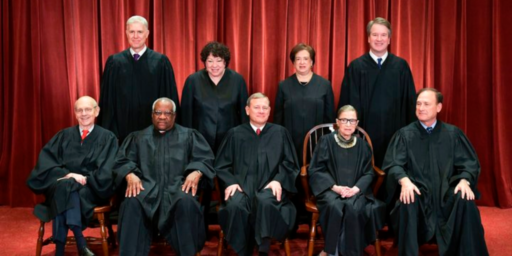
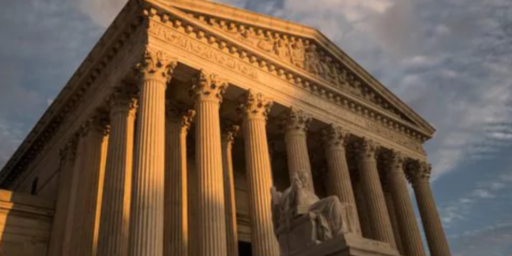

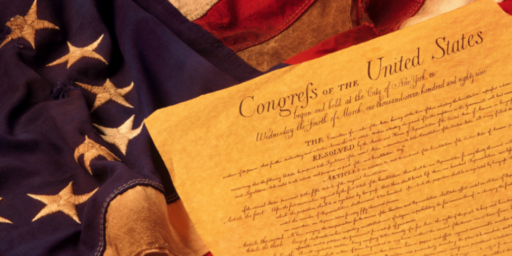
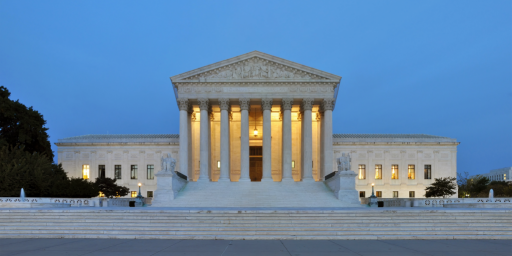
IANAL, but it would seem to me that the act of FEDERAL tax evasion is not the same act as New York STATE Tax evasion.
I’m not completely familiar with NY State tax returns, however it seems to me that both federal and state tax returns generally require attestation to the truthfulness and accuracy. Signing one’s federal return is a separate act from signing one’s state return, consequently two separate and independent acts.
@Bob@Youngstown:
That was my thought as well.
@Bob@Youngstown:
Well obviously that’s the case but that is not what we’re talking about in most double jeopardy cases.
It’s just a conniving way to circumvent the Constitution. Same goes for allowing a “wrongful death” suit to go forward after the accused is found not guilty. I believe the Founding Fathers wanted to protect Americans agains subsequent prosecutions for the same crime. And I don’t believe they would have approved of legal loopholes.
I(also)ANAL. On the practical effect it’d a tough call. There is the obvious opportunity for abuse by prosecutors. But we also have a history in this country of less than zealous action by local prosecutors, particularly wrt/ civil rights. It’s also easy to imagine the Koch Bros and ALEC engineering a situation so that after a major spill they can plead to a state charge to forestall a Federal criminal charge.
@Doug Mataconis:
True enough Doug, and it well may be that the specific case that SCOTUS is taken up does appear to fall under 2XJ. However, it’s not clear to me that the Manafort situation is typical of (potentially) double jeopardy.
Seems to me the doctrine should be some combination of the double jeopardy clause and supremacy clause. If an act is criminal under both Federal and State laws, and a final adjudication is reached under one of them before charges are brought under the other one (e.g., the defendant is convicted or acquitted in a State trial before the Feds bring charges), the early bird gets the worm and the the double jeopardy clause precludes the other sovereign from bringing its own charges. Alternatively, if they both bring charges before a final adjudication is reached by either of them, the double jeopardy clause prevents both prosecutions from going forward, and the supremacy clause leaves it up to the Feds whether to bow out themselves or require the State to bow out.